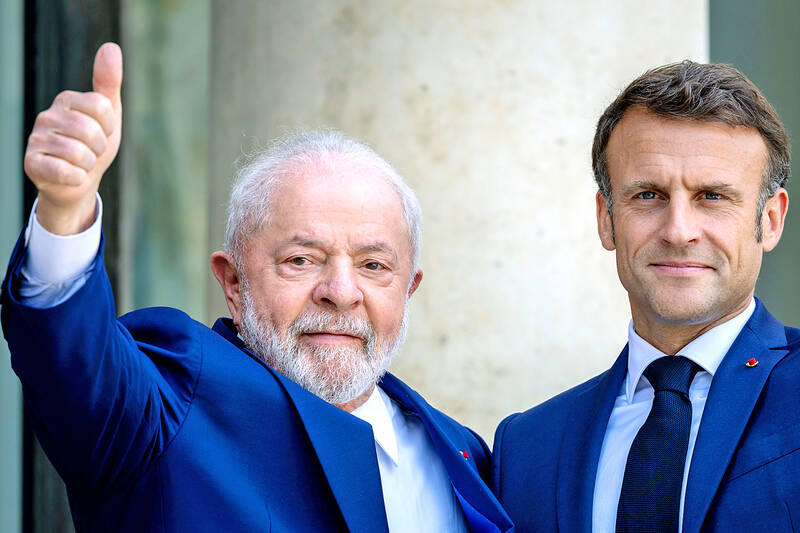A global climate summit wrapped up on Friday with leaders agreeing that the international financial system was woefully inadequate in an era of global warming, after taking a number of small steps to helping debt-burdened developing nations.
While host country France pitched the conference as a consensus-building exercise, leaders were under pressure to produce clear outcomes from the two-day meeting as economies stagger under growing debt after successive crises over the past few years.
The summit comes amid warnings that the world’s ability to curb global warming is reliant on a massive increase in clean energy investment in developing countries.

Photo: EPA-EFE
French President Emmanuel Macron hailed a “complete consensus” to reform global financial institutions and make them “more efficient, fairer and better suited to the world of today.”
About 40 national leaders gathered in Paris, most from developing countries whose economies have been buffeted by crises in recent years, including COVID-19, Russia’s invasion of Ukraine, soaring inflation and extreme weather events.
The conference heard time and again that the nearly 80-year-old financial system — underpinned by the World Bank and the IMF — was no longer fit-for-purpose in facing 21st century challenges.
“With this mechanism, the rich are always rich and the poor are always poor,” Brazilian President Luiz Inacio Lula da Silva said.
While there was agreement on the broad outlines of the problem, there was less progress on steering the global financial juggernaut in a new direction, although there were several incremental initiatives and advancements on existing promises.
World Bank President Ajay Banga on Thursday said the lender would introduce a “pause” mechanism on debt repayments for countries hit by a crisis so they could “focus on what matters.”
One key announcement came from IMF Managing Director Kristalina Georgieva, who said a pledge to shift US$100 billion of liquidity-boosting “special drawing rights” into a climate and poverty fund had been met.
Overall, the progress made was “not sufficient,” said Friederike Roder, vice president of global advocacy at Global Citizen, adding that the IMF target included a US pledge of US$21 billion that is stuck at the US Congress.
However, she said the meeting had managed to “totally change the conversation” on tough issues that have up to now been mostly kicked into the long grass.

The Central Weather Administration (CWA) yesterday said it expected to issue a sea warning for Typhoon Fung-Wong tomorrow, which it said would possibly make landfall near central Taiwan. As of 2am yesterday, Fung-Wong was about 1,760km southeast of Oluanpi (鵝鑾鼻), Taiwan’s southernmost point, moving west-northwest at 26kph. It is forecast to reach Luzon in the northern Philippines by tomorrow, the CWA said. After entering the South China Sea, Typhoon Fung-Wong is likely to turn northward toward Taiwan, CWA forecaster Chang Chun-yao (張峻堯) said, adding that it would likely make landfall near central Taiwan. The CWA expects to issue a land

Taiwan’s exports soared to an all-time high of US$61.8 billion last month, surging 49.7 percent from a year earlier, as the global frenzy for artificial intelligence (AI) applications and new consumer electronics powered shipments of high-tech goods, the Ministry of Finance said yesterday. It was the first time exports had exceeded the US$60 billion mark, fueled by the global boom in AI development that has significantly boosted Taiwanese companies across the international supply chain, Department of Statistics Director-General Beatrice Tsai (蔡美娜) told a media briefing. “There is a consensus among major AI players that the upcycle is still in its early stage,”

The Central Weather Administration (CWA) yesterday said it is expected to issue a sea warning for Typhoon Fung-wong this afternoon and a land warning tomorrow. As of 1pm, the storm was about 1,070km southeast of Oluanpi (鵝鑾鼻), Taiwan’s southernmost point, and was moving west-northwest at 28 to 32kph, according to CWA data. The storm had a radius of 250km, with maximum sustained winds of 173kph and gusts reaching 209kph, the CWA added. The storm is forecast to pass near Luzon in the Philippines before entering the South China Sea and potentially turning northward toward Taiwan, the CWA said. CWA forecaster Chang Chun-yao (張峻堯) said

‘SECRETS’: While saying China would not attack during his presidency, Donald Trump declined to say how Washington would respond if Beijing were to take military action US President Donald Trump said that China would not take military action against Taiwan while he is president, as the Chinese leaders “know the consequences.” Trump made the statement during an interview on CBS’ 60 Minutes program that aired on Sunday, a few days after his meeting with Chinese President Xi Jinping (習近平) in South Korea. “He [Xi] has openly said, and his people have openly said at meetings, ‘we would never do anything while President Trump is president,’ because they know the consequences,” Trump said in the interview. However, he repeatedly declined to say exactly how Washington would respond in